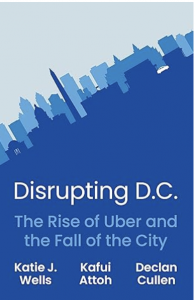Uber arouses strong opinions, for some good reasons. The trouble is – for those who strongly dislike the company’s treatment of its drivers – that it offers a service users and even some drivers seem to like a lot. That tension is at the core of Disrupting DC: The Rise of Uber and the Fall of the CIty by Katie Wells, Kafui Attoh and Declan Cullen. While the authors are clearly Uber critics, they acknowledge that the interviews on which the book is partly based reveal both sides of the coin. The account it contains of how Uber interacted with policymakers in DC is interesting too, playing into the city administration’s desire to embrace innovation.
However, the key point, is that Uber’s opportunities stem from cities’ failures. I can remember the shock I experienced trying to take taxis even in central DC or to and from the airport back in the 1980s, when it seemed more like a developing country. In many cities Uber has prompted other tax companies to improve their service. Of course Uber – like many fintechs – is taking advantage of opportunities for regulatory arbitrage (and some regulation is good and necessary, other regulations not so much) but also of the failure of cities to provide other infrastructure. Its opportunity to claim to provide a less biased and more responsive means of public transport depends on the absence of good public transport.
The chapters are written by different authors so it’s a slightly disjointed read. I found the chapter on data interesting given my own work in this area – it beats me why regulators don’t require data access when they do any deals with private companies. But all round, worth a read as an interesting and nuanced Uber case study.

I feel much the same about Amazon. Nowhere else is offering such convenient same-day delivery or gift wrapping to my knowledge (even though I hate their website and customer service, so really room for improvement!). Wish someone would step up and compete, but they are so dominant. If more other retailers would offer me same-day delivery (willing to pay a premium) or preferably timed slots on a day AND at a time of my choice rather than usual current all-day slots unless it is a large item, I am ripe for moving away from Jeff Bezos’ evil empire and have been for several years, but such services are hard to come by. Selfridges did offer more flexible delivery options when I bought something a couple of years ago, but have a limited range of goods and a lot of them pricy.
Or, actually even if a variety of retailers would offer a better choice of delivery options and if Royal Mail would let customers upgrade to same-day delivery, I would be persuaded to shop more elsewhere. I buy just about anything grocery delivery services will bring with my weekly shop because of the convenience, but they usually offer a limited range of items, as their focus is groceries. Since Covid, I am more interested in delivery and less willing to go and collect parcels from local shops.
The goal of Uber (as well as amazon and social networks) is to acquire monopolistic intermediation, so that they can squeeze first providers, and then customers. Bribing politicians is an integral part of that game plan.
Couldn’t agree more about the state of taxi service in DC before Uber arrived. It was a nightmare of poor service, surly treatment, unpredictable failure, and erratic pricing. And with some competition now between Lyft and Uber, it seems that drivers are now getting a better deal too. More recently, the two services seem to have broken the price gouging monopoly that used to control taxis out of Dulles airport. Two cheers.